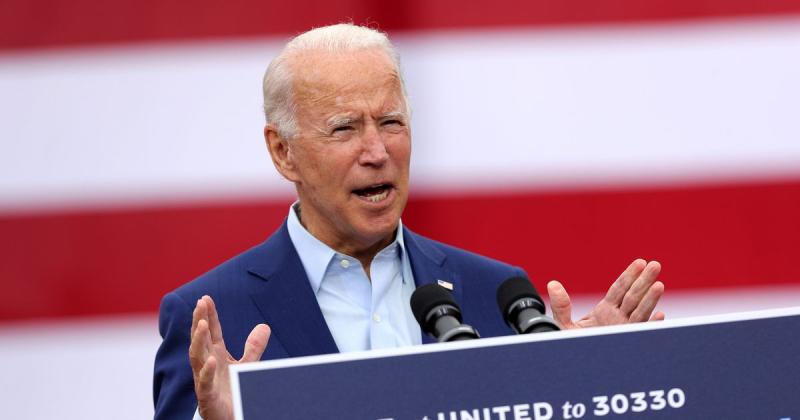Economist: Biden Plan Creates 7 Million More Jobs Than Trump



Photo: Chip Somodevilla/Getty Images
Moody's Analytics, an economic-research firm, has published an economic forecast weighing the effects of Joe Biden and Donald Trump's proposals. It finds Biden's plan would produce dramatically faster job growth and higher wages for most workers.
Biden's proposals would lead to 18.6 million new jobs during his first term, and the average American's income (after taxes) would increase by $4,800. Trump's policies would lead to an increase of 11.2 million new jobs by 2025, with minimal real income gain for average households.
Graphic: BEA/Moody's Analytics
The main reason Biden's plan would produce a faster recovery is that it would increase short-term deficit spending. With interest rates very low and demand depressed, an infusion of deficit spending can accelerate growth quickly.
One might think there is a tradeoff between long-term and short-term growth inherent in Biden's plan to fire the money cannon. But the report does not support that assumption. Indeed, it estimates Biden's plans would also yield higher long-term growth than Trump's. Biden's plans to spend more money on infrastructure would boost growth (more than Trump's plan to periodically declare "Infrastructure Week" as a quasi-holiday observed by morbid jokes by Washington political operators and the media). Likewise, paid family leave, elder care, and early childhood education would also increase the productivity and size of the workforce. Trump's restrictive immigration policies would have the opposite effect.
Conservatives might instinctively reject the idea that higher taxes and regulations could produce more prosperity. The study does not ignore the negative effects of those policies. It simply calculates that the pro-growth effect would be larger. The "benefits to long-term growth will more than offset the economic costs from the higher marginal corporate and personal tax rates under his plan that reduce the incentives to save, invest, and work, the disincentives to work and save from the larger social benefits, and the higher federal minimum wage that would be phased in over a long enough period to mitigate much of its negative effects on jobs."
Given that Biden's proposals produce more prosperity in both the short term and the long term, why would anybody oppose them? People like prosperity, right?
The analysis has a pretty simple explanation. For wealthy people, most of the gains would be taxes away: "Stock prices also rise, but the gains are limited. This is because of high current market valuations that limit prospects for near-term gains and the pedestrian growth in corporate profits under Biden's policies, as more of the benefits from the stronger economy under his policies go to workers." Biden's plan combines short-term stimulus to goose the recovery with long-term social spending. The latter is offset by a pretty big tax hike on the rich and owners of businesses.
Moody's does not go into detail, but an analysis by the Tax Policy Center earlier this year modeled how big the hit would be for the very rich:
Obviously, the richest one percent aren't a huge share of the population. (Roughly one percent, in fact.) But they do have an outsize influence on Republican policy, which has for decades made reducing the tax burden of the very affluent its preeminent policy goal.
One of the deep ironies of the economic debate is that Trump is benefitting enormously from having followed a Biden-like program. As Josh Barro argues, the economic support from the CARES Act pumped trillions of dollars into household budgets, lifting incomes and preventing many small business owners from going under. That effect seems to have lifted Trump's economic approval, which is his only major source of campaign parity.
Trump, in turn, is claiming that he can restore prosperity by applying his special dealmaking magic. And a fair number of voters believe it. But the reason they believe it is that he signed a huge spending bill mostly designed by Nancy Pelosi's Democrats.
To an extent, enough Republicans have themselves fallen for this delusion, and are quibbling over negotiations rather than accepting the second massive stimulus bill the House passed. To the extent they have drunk their own Kool-Aid, they have talked themselves out of accepting an economic lifeline.
If Biden does win, it hardly guarantees the passage of his agenda. Even a Democratic Senate majority might balk at passing his plans, especially if Senate traditionalists allow the filibuster to strangle his agenda. But Moody's Analytics is telling them that, if they decide to govern, they will be rewarded by a rapid economic recovery. Whatever backlash they think they will suffer from filibuster nostalgists would surely be overwhelmed by the updraft of a rapid recovery.
To have that opportunity, they may need to convince the public that they have a real plan to put people back to work. The good news is that, in fact, they do.




Vote Democratic to insure a strong economy ahead!
For who, China?
Right back to Obamas failed policies. I'm having shovel ready flashbacks.
Note the date of that cartoon - 2010.
Obama inherits the Republican's economy in free fall debacle with the Dow at about 6,600 then hands it back to the Republicans in 2017 at 20,000.
Even with the Stimulus Package and Bank Bailouts, the Democrats managed to bring the deficit back down to below the Bush deficit in 6 years. Then turn it over the Deal Maker in Chief who doubles it in 3 years - that's before Covid.
The guy who cannot make a profit with a casino is in charge of the entire American economy.
What could possibly go wrong.